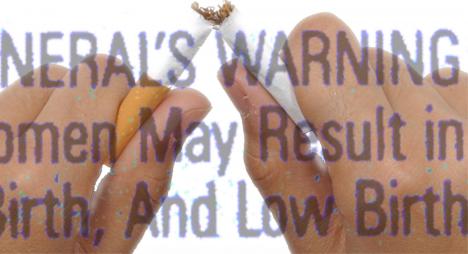Health Alliance helps members kick addictive, cancer-causing habit

Photo Illustration Dan McDonald
August 27, 2004
Health Alliance Medical Plans’ “I Can Quit” program has passed the test. After participating in the program for 12 months, 29 percent of the program’s participants are still smoke-free.
According to Dr. Robert Scully, chief medical officer for Health Alliance Medical Plans, the program’s success rate is consistent with the best national programs, which usually report a 25 to 30 percent success rate.
“I really think it’s because of the combination of behavior modification with the support of the physician and with drug coverage that we’ve been as successful as other programs in the nation,” he said.
“I Can Quit” was started in April 2003 when Health Alliance partnered with Leade Health of Ann Arbor, Mich., to create a comprehensive program.
Interested members first meet with a counselor to determine if they are ready to quit. If ready, the person is then placed in one of three coaching tracks. They include an intensive telephone coaching program involving 10 phone calls over a year, a less intensive telephone program with print material and an Internet option.
Get The Daily Illini in your inbox!
Based on published material, Scully estimates people who attempt to quit without any assistance other than a nicotine patch have a 5 to 10 percent quit rate.
For up to two months, Health Alliance covers the cost of the patch or the prescription with a $15 co-payment.
Scully said participants have identified several reasons why they decided to kick the habit, ranging from pressure from family and friends to the health consequences.
Scully also said college students may have an easier time quitting in their youth than a middle-aged person who has been smoking for a longer time.
Ilene Harned, coordinator for the Alcohol and Other Drug Office at McKinley Health Center, said there are several health risks associated with smoking besides the commonly known problems.
“Routinely, people think about lung cancer and emphysema, but in college students we are seeing an increase in asthma and allergies,” she said. “For heavy smokers, typically their immune systems don’t work as well so when they get a cold they do not get well as quick as they would have otherwise. We know it affects their endurance and ability to exercise.”
Urbana resident Mark Spomer has smoked for the last four years. He said that although he is not interested in quitting right now, he supports the idea of programs to help them quit.
“I think it’s good to let people know that it’s bad, and I’m always willing to listen,” Spomer said.
Students trying to quit smoking can make an appointment for one-on-one counseling at McKinley Health Center, or take advantage of self-directed kits to stop smoking called Step by Step. Also, McKinley offers the Patch and Zyban at a reduced rate to students, but they must have a medical prescription.
For Scully, it’s enough that people have the option to have support when they decide to quit smoking. Two percent of eligible smokers decided to participate in the program, and he hopes for another two percent next year.
“We’ve had people write and say ‘You’ve saved my life, I couldn’t have done this without the program,'” he said. “We are not trying to force someone to do it; we just want them to know when they are ready we have a program there for them.”






